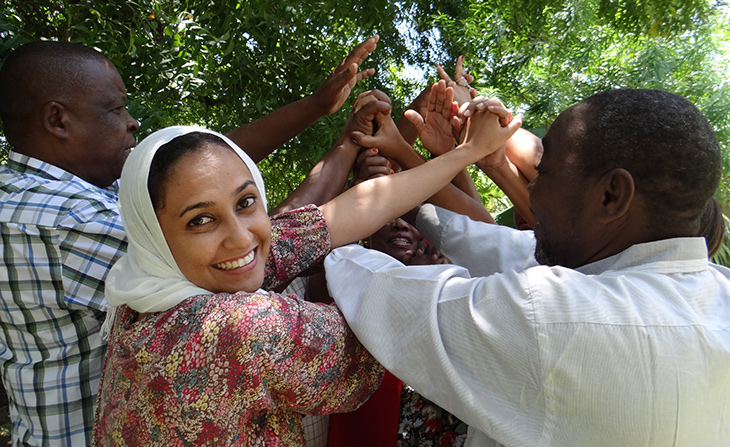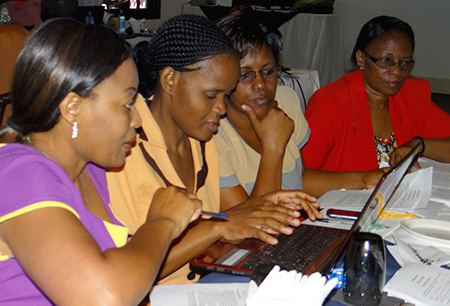The Health Policy Project ended in 2016. Work continued under Health Policy Plus (HP+) until 2022.
NEWS & VIEWS

Staff members from the Mombasa County Health Department participate in team-building activities to strengthen coordination for better health services. Photo by the Health Policy Project.
October 23, 2014
MOMBASA, Kenya—The Health Policy Project (HPP) in Kenya recently gave assistance to the Mombasa County Department of Health to develop a new organisational structure as part of its ongoing restructuring efforts. The new structure will help to clarify roles and responsibilities in the management of health services in the county under the devolved governance system.
Prior to the onset of devolution in March 2013, health services were delivered by three different agencies – the former Ministry of Medical Services, Ministry of Public Health and Sanitation, and Mombasa Municipal Council. Thereafter, all three agencies were merged to form the Mombasa County Health Department. However, the transition has been difficult and complex, as the previously vertical agencies try to meld together under one leadership.
For instance, the merger led to duplication of offices and positions with employees from the three different agencies often not acting in harmony, resulting in contradictory instructions and frustration among the staff. “The department was facing instability and disunity, and there has been a lot of fear,” said Ms. Binti Omar, the county executive committee member for health, as she opened the workshop. Dr. Khadija Shikely, the county’s chief officer of health also remembers how difficult it was at the beginning, without a structure: “We could not move without knowing who was doing what, what new offices were needed. We had all these high-level senior officers, with no organisational structure, no idea of who reported to who.”
It is against this background that Ms. Omar, on behalf of the county, requested HPP/Kenya to provide technical assistance to the department to develop and implement an organisational structure and help streamline operations. A technical committee was formed to review the existing regulatory and policy frameworks for devolution and the implication for the health services management structure at county level. The first draft of an organogram was developed and the required mix of skills required to perform the specific functions identified.
During a five-day workshop that took place on 12-17 October, participants discussed in detail the new organisation structure and the specific job descriptions for each office. The functions and qualifications for the core positions in the structure were developed and agreed on. The participants also developed a change management plan to ensure that transition to the new structure is smooth and meets with acceptance.
“We have been given tools and templates and a lot of help by HPP in conducting job analysis, as well as identifying the specific tasks the different offices in our structure will be responsible for,” Dr. Shikely stated during the workshop.
One participant observed that the proceedings of the week had brought much clarity to the restructuring process and will help the department move forward as one: “Before we started this process, there was so much confusion and poor morale because some people felt that their jobs were threatened. But now, it is clear what the changes are and we can all apply for the new posts once advertised.”

Mombasa County Health Department staff during a working session to manage change related to devolution. Photo by the Health Policy Project.
It is anticipated that the new structure and change management plan will be implemented immediately. “It is an exciting time for Mombasa County now, a new beginning,” remarked Dr. Shikely, adding that she feels more hopeful now that the reorganisation will be successful.
“I am so happy with the quality of work we have been able to achieve this week, this has been very fruitful” added Ms. Helena Kithinji, one of the workshop facilitators.
This workshop is part of Health Policy Project’s ongoing support to the national and county governments in Kenya as they negotiate devolution. The devolution of governance under a new Constitution was in response to public demands for leadership that is accountable and transparent at all levels. Health managers at county, sub-county and facility levels are therefore accountable for health outcomes.
“There is immense value in developing management structures through participation, acceptable scientific methods, and best practices in organisational development”, says Mr. Aaron Mulaki of the Health Policy Project, adding that the new organisational structure for Mombasa County will be critical in ensuring that it delivers on the constitutional guarantee to the right to health for citizens. The county public service board and county assembly will ratify the organisational structure before adoption.
For more information on HPP’s work in Kenya, visit www.healthpolicyproject.com/kenya
What's New
- Something to Build On: “Innovation Exchange” Celebrates the Health Policy Project’s Close and a New Beginning
- What Will it Take for Tanzania to Achieve ART Targets and Ensure Long-Term Sustainability of the HIV Response?
- Helping Kenya’s County Leaders Advocate for Increased Health Investments
- HPP Holds Working Meeting on Ensuring Responsible PEPFAR Transitions for Key Populations
- Health Policy Project Celebrates 2016 International Women's Day
- HPP Staff Participate in White House Conference on HIV Stigma Reduction

